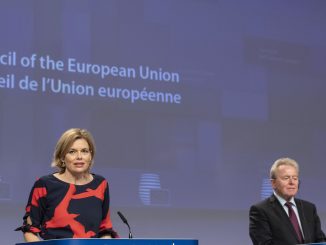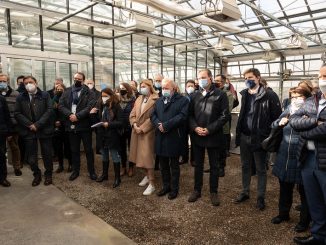
Jean-Marc Desfilhes and Hannes Lorenzen present a history of French farmers’ associations and social alliances in light of the recent demonstrations and associated political reactions. They propose: Now is the time to mobilise love and protest to stop the current agricultural policy rollback.
This article is translated from the German version appearing in the Bauernstimme.
By Jean-Marc Desfilhes and Hannes Lorenzen
The French love their farmers. Surveys conducted during the major demonstrations at the beginning of the year showed great understanding among the French population for the mobilisation throughout the country. But the government fears them. Protest and love can make a difference together. The newly elected French Prime Minister Gabriel Attal was therefore immediately on the scene in February and promised pretty much everything: more money, less bureaucracy and environmental regulations, if necessary France going it alone in agricultural policy, no Mercosur trade agreement, and so on. The police were very lenient for a long time. It was only when the blockade of Paris threatened that the love was over. It is worth taking a look at the history of French farmers’ organisations and agricultural associations.
Historical perspective
France’s farmers’ organisation, the FNSEA (Fédération nationale des syndicats d’exploitants agricoles), has a central position. The Vichy government, which collaborated with the Nazi occupiers, founded the Corporation Paysanne, which was supposed to represent the interests of the entire agricultural sector. The FNSEA emerged from this in 1946.
With the end of the Second World War, a profound change in the social position of farmers began with the introduction of social security, the end of sharecropping and the strengthening of farmers’ rights vis-à-vis the owners. The FNSEA organised this modernisation by centrally controlling the granting of credit, the cooperatives and the redistribution of land.
In the mid-1960s, the association’s dominant position began to crack. The large number of small farms rebelled, resisting the pricing policy, increasing debt and the FNSEA’s favouritism towards growing farms. Some organised themselves into the Confédération Nationale des Syndicats de Travailleurs Paysans (CNSTP). Others founded the FNSP (National Federation of Farmers’ Unions). Both later gave rise to today’s Confédération Paysanne, which remained the only opposition to the FNSEA until 1992 and continues to represent the interests of small and peasant farmers in France today.
The CAP reform of 1992 led to a lively debate in France about the distribution of subsidies from Brussels and to fierce protests, including against the FNSEA. The FNSEA demanded per-hectare premiums in order to maintain the status quo of the EU’s Common Agricultural Policy (CAP) and to promote growing farms.
Demonstrations against this took place in the disadvantaged south-west of France in particular. The Confédération Paysanne criticised productivism, structural overproduction and the drastic loss of income for the vast majority of farms. It was and is politically independent and is more closely aligned with the left-wing political spectrum and environmentalists.
However, there is also peasant protest on the right of the political spectrum. The Coordination Rurale, for example, is openly claimed as a political organisation by Marine Le Pen’s far-right party. The FNSEA does not need to commit itself politically; it has had and still has a permanent seat in literally every government in its Ministry of Agriculture.
The chambers of agriculture
Elections to represent the agricultural profession take place every six years in France. They are the yardstick for the influence of the three largest farmers’ unions on national agricultural policy. The Confédération Paysanne achieved its greatest influence with José Bové in 2001 (28%) against the backdrop of the liberalisation of agricultural markets and the mobilisation against the WTO, GMOs and patents.
Since then, it has lost supporters, while the right-wing Coordination Rurale has made gains. The FNSEA could fall below the symbolic 50 per cent mark for the first time in 2025. However, it can be assumed that the FNSEA will continue to have a significant influence on the next, possibly early, reform of the CAP.
The recent farmers’ demonstrations in France followed those in the Netherlands, Belgium, Poland and Germany. In France, too, they were triggered by new legal requirements and expiring tax benefits. However, the heated mood was based on the generally precarious income and sentiment situation, especially on farms with animal production. Only half of all farms have successors, and France has lost 20% of its farms in the last ten years. The rural infrastructure is shrinking, dramatically in some regions, and newcomers hardly stand a chance due to high land prices and operating costs
Panic in Brussels
From this point of view, the current panicked reactions of the government and the EU Commission are both low-effort and completely misguided. Reducing bureaucracy and controls does not help most farms economically, and retained tax benefits only in the short term. The current evisceration of the Green Deal is merely a means of distracting attention from the real problems of unfair global agricultural trade and the rising profit margins in the industries upstream and downstream of agriculture.
Under the leadership of FNSEA President Christine Lambert, COPA, the European federation of leading agricultural associations, has succeeded since the beginning of the war in Ukraine in bringing 4 million hectares of European fallow land (300,000 hectares of which are in France) back under the plough, under the slogans of food sovereignty and feeding the world. Copa has prevented the banning of neonicotinoids and pushed through the extension of the authorisation of glyphosate. Now it is a question of authorising new GMOs. The French government is taking this roadmap at face value. A historic irresponsibility in the face of climate chaos and public health.
Social alliances
But there are also counter-movements. With the founding of the Collectif Nourrir alliance, the French action platform Pour une autre PAC has made a new attempt to bring together the various interests from the environmental, climate and social movements in a common food strategy. With a declining agricultural and rural population, the alliance is endeavouring to draw more influence on political decision-makers from the commitment of the urban population.
The public relations and educational work of Collectiv Nourir focuses on qualifying public support for the CAP with a view to the major challenges of the environment, climate, biodiversity and social justice. Collaboration with national alliances in Europe such as the German Platform of Associations on the Common Agricultural Policy is being sought, but in practice this is still difficult due to language barriers and a lack of opportunities for cooperation.
Without social alliances that bring together a broader understanding of and commitment to the urgent changes in agriculture, the environment and food – at both national and European level – the current agricultural policy rollback will be unstoppable for many years to come. So now is the time to mobilise love and protest effectively again.
More
Don’t Dismantle CAP’s Green Rules say 330 European Organisations





